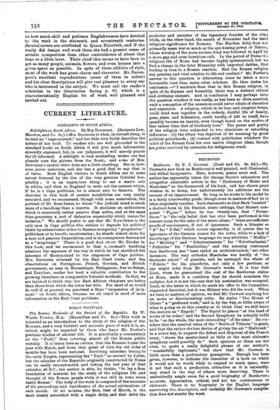BEETHOVEN.
Beethoven. By F. J. Crowest. (Dent and Co. 3s. 6d.)—Mr. Crowest'a new book on Beethoven is well printed, well illustrated, and withal inexpensive. Here, however, praise must end. The author has apparently taken Sir George Grove's exhaustive and altogether admirable article in the " Dictionary of Music and Musicians" as the framework of his book, and has shown great wisdom in so doing, but unfortunately his additions are the reverse of an improvement. So long as he sticks to his model he is a fairly trustworthy guide, though even in matters of fact he is often singularly careless. Such statements as that Bach "created" a distinct form in his Passion music settings, that Mozart com• posed " Figaro " before he was twenty-one, that " Prome- theus" is "the only ballet that has ever been performed in the concert-room for the sake of the music alone ; " these are sufficient proofs of carelessness, if not of ignorance. Such a blunder as " B" for " B flat," which occurs repeatedly, is of course due to ignorance of the German names for the notes, while to a lack of knowledge of the German language we may attribute " Malin " for " Modling " and " Schottenbastein " for " Schottenbastei." " Pultriller" for " Pralltriller," and the amusing statement that Beethoven has " been styled an architektoniach," are other instances. The very orthodox Moecheles was hardly of " the fireworks school" of pianists, and he arranged the whole of " Fidelio " for the pianoforte, not only a few portions, as one might infer from Mr. Crowest's words. It is true that Liszt, when he guaranteed the cost of the Beethoven statue at Bonn, made it a condition that he should nominate the sculptor, but it is not the case that his nomination was accepted. Liszt, in the letter in which he made his offer to the Committee, suggested Bartolini, but it was Hiihnel who did the work. When we turn to matters of opinion, we find Mr. Crowest anything but an acute or discriminating critic. He styles " The Mount of Olives " a " profound work," and is, by the way, so little aware of what is going on in this country as to think that we still know the oratorio as " Engedi." The Septet he places " at the head of works of its order," and the Second Symphony he actually holds to be " on the whole, the most interesting " of the nine ! He con- siders that the musical value of the " Battle of Vittoria " is great, and that the rather obvious device of giving the air " Malbronk " in a minor key, to suggest the defeat and dispersal of the French army, " shows the master-hand as fully as the most elaborate symphony could possibly do " Such opinions as these are not even, to quote a really delightful phrase of our author's, " wonderfully legitimate," but show that Mr. Crowest is little more than a perfunctory panegyrist. Enough has been given, however, to indicate the character of a book on which it would not be worth while to expend so much space, were it not that such a production, attractive as it is outwardly, may stand in the way of others more deserving. There is undoubtedly ample room for a good biography of Beethoven ; accurate, appreciative, critical, and not too cumbersome or elaborate. There is no biography in the English language answering this description, and certainly Mr. Crowest's compila- tion does not supply the want


















































 Previous page
Previous page